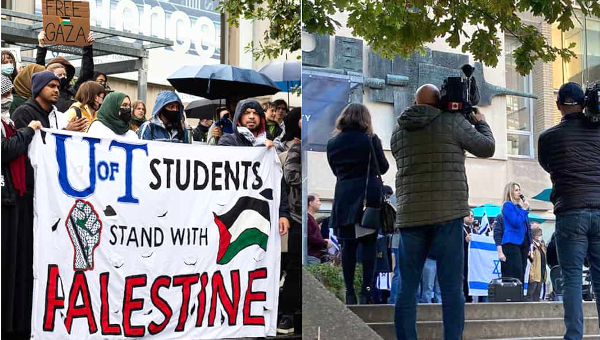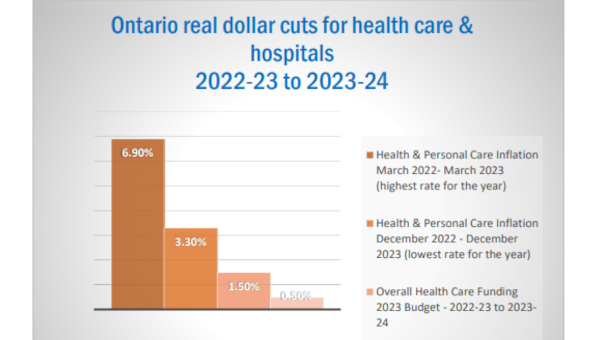Ontario and the Funding of Religious Schools
In what might turn to be the defining issue of the Ontario provincial election set for October 10, Conservative leader John Tory proposed that faith-based schools be fully funded. In a province that already funds Catholic schools through the high school years. The Tories are claiming the mantle of ‘fairness’ by extending funding to other religious schools. This position, indeed, is being heatedly debated.
Socialists and the Education System
The debate has raised a number of issues for socialists, with respect to both religion in a complex multicultural society, and the demands for a more democratic and egalitarian education system in Ontario.
Socialists have long critiqued religion as an aspect of the power structures that support the existing social and political order. Religion has also underpinned many patriarchical practices that oppress women. And religious majorities have often suppressed religious and national minorities. Socialists have, therefore, been uncompromising on the demand for a secular state and the end to public subsidies of religious institutions. The insistence on a secular state has gone along with firm support for the protection of the rights to practice religion in private life without discrimination, as part of rights of freedom of assembly, and a vigorous defence of religious minorities.
Socialists have also favoured an educational system as a means to develop the capacities of working people. These are not only the technical capacities for work, but also capacities for democratic self-government, and deepening cultural, scientific and political understandings. This is also the special role of teachers in the public school system: they are not merely conveyers of required knowledge, but the facilitators for building critical democratic citizens in the broadest meaning of those ideas.
A universal public school system has been a crucial objective. It is the reason that the private school system that the capitalist and professional classes often resort has been a fundamental target for reform and incorporation within the public system. And it is why socialists have to continually engage in criticism, debate and engagement with public schools and their curricula. Teachers’ unions have often been key allies in Ontario in raising issues of both funding and social justice in Ontario schools. Education in capitalist societies has to be continually contested as it is not ground the ruling classes will ever willingly concede.
In the case of Ontario, there clearly should be no funding of any faith-based schools, and this would include the present funding of separate Catholic schools. The public system is already starved for resources and funding religious schools will further weaken it. Full funding of religious schools flies in the face of some of the most elementary principles of modern democratic societies such as the separation of church and state. It reinforces conservatism and weakens equality and human rights. It undermines the integration of students from diverse backgrounds so necessary in today’s Ontario.
Resources
The Conservative proposal, in some estimates, would take $500 million out of an already cash strapped public education system. Expanding public funding for religious schools would undermine the resource base of the entire public school system. After years of underfunding – first by the Harris and Eves’ governments and by the McGuinty Liberals – the school system cannot afford a diversion of funds to religious schools. Resources would have to be effectively cut to fund this initiative. There are currently 52,000 students attending independent religious schools, including Jewish, Muslim and some Christians (more than 10 times that number are in the separate Catholic schools, and in total accounting for just about a third in religious schools in Ontario). The funding of faith-based schools would dramatically expand these numbers and the variety of religious schools. The economics of funding public schools (as well as some of what is taught) would be dramatically altered. There would be further difficulties in sustaining public schools infrastructure, and wide community access to the facilities of schools. There is a general crisis in public education in Ontario. This debate needs to be widened to take up that issue as well.
Defending Public Education
Private religious beliefs have no place in a public education system. The separation of religion and state is a key element of democratic politics. Every individual has a right to practice religion as they wish – or to be atheists. But the public education system is not the place to do this. It is a place that students from all backgrounds to mix and learn together and to become critical thinking and informed citizens. Parents are, of course, free to send their children for after-school or weekend instruction as they wish. Such teaching should be privately funded and separate from the public system.
The funding of Catholic schools was the result of a constitutional compromise in Canada in the mid-19th century. It dates from an era where national and linguistic rights between French and English were identified with religious rights. This same identification hardly fits Ontario today; it has no place in a modern, secular, liberal democratic society. The extension of funding to Catholic secondary schools in 1984 was a coldly calculated political move by then-Premier Bill Davis, made just as he was about to retire. It was a deal originally cut in private between himself and the then Roman Catholic Cardinal for Toronto. Even Davis’s cabinet was unaware of this decision, but the rigidities of Cabinet solidarity pushed into legislation. The deal was hardly an emblem for democratic decision-making. It was sealed by further backroom deals with the Liberals and NDP, scrambling for advantages in minority legislatures, not to reopen the funding issue.
While politically arduous, funding for separate schools in Ontario can be ended without a major constitutional crisis. The existing constitutional clause can be amended by simple pieces of legislation passing the Ontario Legislature and the Federal Parliament. This has been the case in recent reforms in Newfoundland and Quebec. In Newfoundland, the existence of an education system split along religious lines was seen to fuel sectarianism within the larger society and stretched the capacity of the province to provide quality education. With a referendum, all that changed and Newfoundland left 19th century education behind.
It is a shame that neither the Liberals nor the NDP have challenged the funding of Catholic schools in Ontario or the principles on which it is based. Their avoidance of the issue is not based on principle but on vulgar electoral calculation. Their mutual conformity neither advances democracy nor serves the public interest. To their credit, the Green Party is the only party of any size to propose the complete secularization of public education (and it is a crucial factor in their rise in the polls, alongside the clear support for a proportional representation voting system).
Conservatism
John Tory’s proposal is both an ideological statement and cynical electoral ploy. Much of the teaching in currently existing religious schools feeds conservatism: some religious schools argue against the equality of men and women and call for the denial of women’s reproductive rights; some teach homophobia; some call for denial of the national rights of Palestinians, others teach creationism as an alternative to science. Should we subsidize these ideas as we welcome religious schools into the public system? If religious schools become part of the public system, there is little leverage to keep these noxious ideas out of schools even if a core Ontario curriculum is required to be taught.
The Conservative position is also a cynical attempt to bribe votes from religious people in different communities. Relying on traditional stereotypes of immigrants, it directly appeals to the most conservative elements in all of Ontario’s communities and strengthens the voices of those right-wing spokespeople who have tirelessly argued for full funding of religious schools. It correspondingly weakens the progressive forces across Ontario – in immigrant communities, amongst Canadian born and within different religious traditions – who support the secular education provided in the public school system and want real equality.
A dangerous precedent would also be being set. Full funding of religious schools implemented would re-open the attempts by the Conservatives and their wealthy supporters to establish further public funding of private and charter schools. They, too, have been claiming to being left out of appropriate public funding. The separate status of these class-based schools should also be challenged, and be brought into the public system on an equal basis with other schools.
Building a respectful and solidaristic future
Funding religious schools would encourage the separation of children from across the spectrum of communities and cultures that make Ontario’s schools such exciting places of learning. Expansions of faith-based schools would represent a tremendous step backwards: it would move Ontario away from the kinds of schools where students from all of the diverse communities and traditions can learn together in a pluralistic environment of mutual respect and solidarity. That’s the kind of environment where kids can grow into the kind of inquisitive and open-minded individuals who can help change the world. It is also why the discriminatory separate system for Catholics should, at last, be abolished to history. Ontario’s working people should have the option of ending all funding or religious schools, and also addressing private schools, to form a single public school system, allowing linguistic access in French and English. This could be done directly through a programme put before the people of Ontario and then the legislature. But it also could be done through a referendum that would allow wider education and debate about the benefits and kind of unified secular school system we should be building.
Petition:
Ontario Educators for Democratic Inclusive Public Schools
In the few weeks of the Ontario election campaign that will end in a vote on October 10, citizens of Ontario will be subjected to a debate between the parties and in the media about the extension of the public education system to include faith-based schools. These schools teach about 2.5 percent of the total student population of Ontario based on curriculum that incorporates central principles of their religions.
The present educational system in Ontario extends privileges to one faith group in a separate school system. The Ontario system is considered to be discriminatory by the United Nations Human Rights Commission. Two of the main parties – the ruling Liberal Party and the NDP – are proposing to maintain the status quo, while a third – the Conservatives – wants to extend funding to all faith-based schools that follow the Ontario curriculum.
The divisions of faith-based schooling would further compromise a secular-based education. Modern democracy partly rests upon a separation of church and state. An Ipsos-Reid poll of Ontarians has found that 62 percent of respondents opposed the Conservative promise to have “Government extend full funding to these faith-based schools and others of a similar nature.”
Ontario is a multi-lingual, multi-racial, multi-cultural, society. Citizens hold many religious beliefs, and many are without established faiths, including atheists. The 2001 Canadian census reports that 16 percent of the population does not identify with any religion.
An education system for a richly diverse and democratic society must bring together students from all faith, ethnic and economic grouping and backgrounds to learn respect and understanding, and to equalize educational resources and opportunities for all Ontario students. Faith-based school systems build barriers to the equalizing role that a common public school system promotes between citizens. Many parents are rightly concerned about the negative impact of the divisions that faith-based schools necessarily entail for social cohesiveness. The continued growth of a parallel private schooling system in Ontario is an equally formidable obstacle for a democratic education system.
A democratic education is an education for democracy. It requires a dialogue in which students and teachers critically assess their own assumptions and beliefs about religion, society and politics. This is the invaluable resource that a common public educational system – from pre-kindergarten through grade 12 to an expansion of access to post-secondary education – provides.
- We call for Ontario to complete the project of building a democratic, inclusive public educational system, and to end the discriminatory practice of funding faith-based school systems.
- We insist that all religious instruction in any faith be outside regular school hours.
- We maintain that private schooling helps sustain barriers of income and class to a democratic education and citizenship and equally requires inclusion within a universal public system.
- We suggest that a referendum be put before the citizens of Ontario on completing a single, inclusive, universal educational system free from all forms of discrimination and barriers.
If you would like to sign the petition, please go to: www.thepetitionsite.com/petition/876448777
Education Equality in Ontario
Education Equality in Ontario is a non-governmental human rights organization and education advocacy group. We seek the elimination of religious discrimination and duplication in the Ontario school system through the establishment of a single publicly-funded school system for each official language (English and French).
The Government of Ontario currently funds two parallel school systems for each official language; one a public system open to all without discrimination, and the other a ‘separate’ system that often denies admission to non-Catholic students and is essentially closed to non-Catholic teacher applicants. Only Roman Catholics are guaranteed access to both systems. They alone enjoy publicly-funded school choice and they bear no additional tax burden for the privilege. Roman Catholics in Ontario suffer no disadvantage that might warrant such preferential treatment. By allowing this blatant discrimination to continue, the Government violates the equality rights of over seven million non-Catholic Ontarians, discriminating
against them on the basis of their faith or their lack of a faith.
Fundamental equality rights should enjoy primacy over non-fundamental denominational privilege. Publicly-funded choice in education and access to related employment opportunities should be non-exclusive and non-discriminatory in nature, fully respecting the equality ‘guarantees’ in the provincial, national, and international human rights instruments that are supposed to protect us.
Finally, the costly duplication in the Ontario school system has been and continues to be a significant contributor to the steady decline in the quality and quantity of programs available in our publicly-funded schools, both public and separate alike. That duplication must end so that more education dollars can make their way into classrooms, enabling all children to reach their maximum academic potential.
The Canadian Civil Liberties Association is asking community leaders to sign a joint statement that the CCLA and a number of other organizations have put together. This statement calls upon the government of Ontario and all political parties to reject the proposal to publicly fund religious schools in Ontario. If you wish to add your name to the list of signatories, please send your response to: fostering_a_more_tolerant_society@hotmail.com. •





